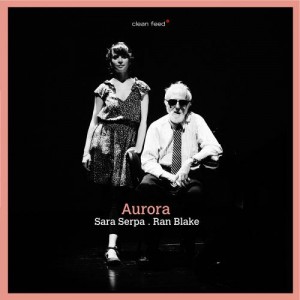Date = 28 March 2013
Artist Name = Sara Serpa and Ran Blake
Genre = Jazz
Title = Aurora
Record Company = Clean Feed
Review = The Portuguese singer Sara Serpa became active on the American jazz scene in 2008. That year, when she received a master’s degree from the New England Conservatory, she recorded with Greg Osby and led her initial session, released as Praia. Subsequently, she recorded a duet album, Camera Obscura, with pianist Ran Blake, and released her second CD as leader, Mobile. Recorded in Lisbon in May 2012, Aurora is another session with Blake.
Praising her originality, daringness, clarity of voice, and ability to sing as an instrumentalist, critics rave about Serpa. Without question, she is daring in her willingness to sing with Blake, one of the most idiosyncratic musicians, and her voice is clear. She is original at least in the sense that her voice is immediately identifiable. I cannot tell from the music on Auroa whether her singing resembles the playing of an instrumentalist, whatever this means. These qualities are positive and warrant praise. She also possesses another quality: uncertain intonation. She is not the first singer to have this problem: Anita O’Day comes immediately to mind, as does Chris Connor, a favorite of Blake. Yet these singers’ occasional inability to stay on pitch was not as frequent or severe as Serpa’s, and they had compensating qualities that Serpa lacks. Occasionally, she reminds me of Jo Stafford, as Darlene Edwards, parodying inferior singers. Does wavering intonation detract from Serpa’s singing? To me, it detracts because it distracts. This is not to say that in order to sing convincingly a singer need be formal and “correct” and must not take liberties. In the end, I believe that Serpa’s sometimes imperfect intonation (as on “Love Lament” and “Wende”) is worth enduring in order to enjoy her other qualities, the ability to convey meaning paramount among them.
As should be expected on a CD involving Blake, the selections reflect his interests, including movies, and his interpretations of familiar tunes are always fresh. On the current release, he chose “The Band Played On” because of its appearance in the movie Strangers on a Train; “Dr. Mabuse,” because it is played in Fritz Lang’s film of the same name. “Last Night When We Were Young,” the sole standard ballad, is moving in its deliberate tempo and nuance. “Cansaço” is a fado. Serpa does not sing on “Mahler Noir,” on which Blake, the composer, segues into “Dancing in the Dark.” Serpa sings “Strange Fruit” a cappella. Despite taking great liberties with it, she remains on key until intentionally wavering at the end, in the manner of Billie Holiday. One wonders, though, how meaningful the lyrics are to this Portuguese who has resided in the United States for only a few years.
In sum, the music of Serpa and Blake is more exploratory than polished, and this, to me, is a major positive. Individualists, the musicians take chances while striving for valid musical expression in an unexpected manner. They succeed in doing so.
Author = Benjamin Franklin V
Music Charts Magazine Jazz Reviews with Benjamin Franklin V
